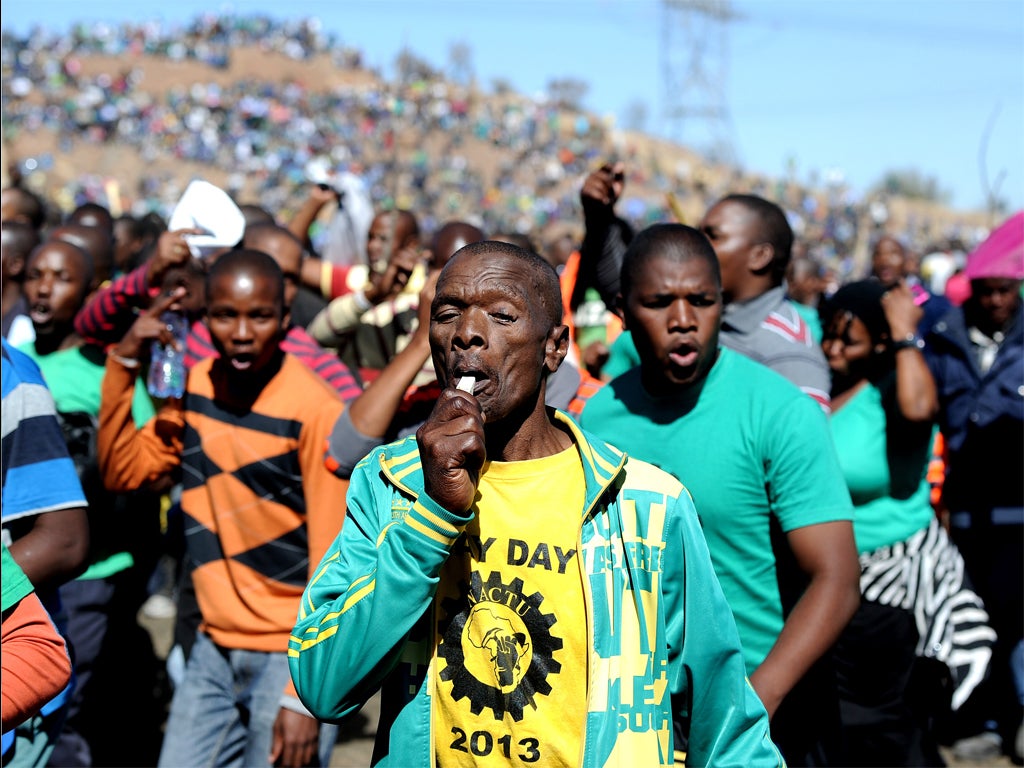Legacy of South African mine killings is still bitter, one year on
Gathering for 34 South African miners shot dead by police is boycotted by ANC

A year after 34 miners were gunned down by police on a dusty hill outside Johannesburg, South Africa continues to grapple with the legacy of their deaths.
A commission of inquiry established by President Jacob Zuma to investigate the killings has yet to deliver its report, and many doubt it will be released before the ruling party’s bid for re-election next year.
No police officer has been arrested over the shootings. The Constitutional Court has yet to hand down its ruling on whether the state should pay the legal costs of the miners arrested and injured. It postponed its decision, initially scheduled for yesterday’s anniversary of the killings, until next week.
Thousands gathered at an open-air commemoration of the 16 August killings, the most deadly use of police force since the African National Congress came to power in 1994, ending white minority rule. Conspicuously absent were officials from the government, the ANC or the National Union of Mineworkers (NUM).
Rivalry between two unions – the ANC-allied NUM and the Association of Mineworkers and Construction Union (AMCU) – was at the heart of last year’s unrest at Lonmin’s platinum mine. Membership of the NUM, which used to be the majority union, has reportedly dropped to 20 per cent among Lonmin’s workforce.
The ruling party’s provincial chapter refused to attend the commemoration, insisting in a statement that it was a politically motivated event. The decision was heavily criticised, and the ANC’s national office later expressed its regret.
The AMCU, which called last year’s unofficial strikes, is again pushing for substantial wage increases. In its statement on the anniversary, the ANC said the government “cannot allow a situation where criminal elements undermine the rule of law under the guise of labour unrest in Marikana.”
“The South African Police Service must restore order and peace in the region, upholding the memory of the compatriots who lost their lives in Marikana,” the ruling party said.
Standing at the bottom of the Wonderkop slope where he scrambled for his life, one miner, Peter Shedie, said last year’s events, when he and his striking colleagues gathered for an update on negotiations, defied imagination.
“We had been told the manager of the mine would meet us to discuss wages,” he said. “If they only had come to talk to us, this wouldn’t have happened.” Instead of Lonmin negotiators, hundreds of police stormed the hill with automatic rifles, leaving 34 dead and at least 78 injured.
“‘Marikana’ has become a byword for resistance,” says sociologist Peter Alexander, who has also written a book about the killings. “Angry farmworkers speak of ‘doing a Marikana’ when they protest, the poor are calling new informal settlements ‘Marikana’, frustrated teachers speak of ‘Marikana’ strikes,” he told The Independent.
“People are still very angry, and the government has isolated themselves,” he said on the sidelines of the commemoration. “It would have been a perfect occasion for the leaders of the two unions to get together and shake hands and show a joint desire for peace.”
“People have begun to overcome the grieving of last year,” Mr Alexander said, adding that the crowd was dry-eyed, but cynical. “Government has never been this out of touch with its electorate,” he said.
The commemoration ceremony was attended by several opposition politicians, including former ANC Youth League leader Julius Malema, who recently founded a new political party ahead of elections next year.
Mr Malema addressed the crowd, denouncing the government, and its response to the Marikana tragedy. He has called for the nationalisation of the country’s mines. Labour unrest continues in the mining sector, with striking workers continuing to demand substantial wage increases.
Subscribe to Independent Premium to bookmark this article
Want to bookmark your favourite articles and stories to read or reference later? Start your Independent Premium subscription today.

Join our commenting forum
Join thought-provoking conversations, follow other Independent readers and see their replies